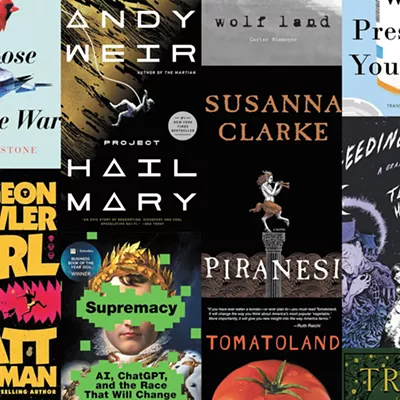Patricia Briggs' cell finally rings around 9 pm, after several days of annoying her with phone messages and e-mails. She answers as if we're old friends, eager and ready to talk into the night while beginning a jovial conversation about the hectic circumstances at home.
This woman has published 23 novels since 1993, is a regular on the New York Times bestsellers list, and yet she's been living in a trailer since March without running water while her home is cleaned of black mold. She pens the immensely popular Mercy Thompson series yet can't help but laugh at the drywall guy who earlier that day threw a fit over their lack of a functioning toilet. She shrugs it off and welcomes the interview, adding how thrilled she is to be a part of SpoCon this weekend.
Having written nearly one novel every year for almost twenty years, how do you find the inspiration to write at a steady pace?
Reading is what keeps me going. I take the spirit of adventure out of what I read. My ultimate weapon against writer's block is the Lord of the Rings trilogy. They're just so beautiful and have such a sense of wonder that I want to write with that sort of curiosity and attitude.
Then you approach writing with a sort of childlike wonder?
A friend once told me that writers can't sit down to work, they have to sit down and play. You have to be able to use your imagination. So I do. I get up every morning and play with my imaginary friends. How cool is that? If most people my age did that, they'd be locked in a funny farm.
Do you see your writing noticeably evolve as the years progress?
All us writers hope to become better ones. Of course it evolves. It evolves when what you have to say about the world changes. Where I am now and where I am at 95 had better be different. Besides, if I write the same book twice, I'm bored. And I don't want to be bored.
But you recently revised your first published novel ...
Because it needed to get done. I can write almost two novels a year pretty steadily until something catastrophic happens, like the remodeling fiasco. So in the wake of that and my contract demanding a new book, my agent thought I could revise Masques. I hadn't read it in eight years, knew it was freshman, and it turned out to be one of the hardest things I've done in my writing career. Trying to revise something I wrote at 25 or 26, I just kept saying, “Oh gosh, they will publish anything won't they?”
Where does the process of creating such complex worlds come from?
Other than characters, world-building is my favorite part. But moving from traditional fantasy to urban fantasy almost felt like cheating. With traditional fantasy, every aspect of the world is created. With urban fantasy like the Mercy Thompson series, the world is already there, and the characters dictate how it is presented. I also try to throw in some political commentary whenever I can. It's one of the consequences with majoring in history. Maybe political commentary is the wrong term. How about commentary on human nature as inspired by politics?
With such an interest for history, have you ever considered another genre?
I chose fantasy because it allows me to write any genre I want. Mystery, romance, thriller, or whatever, and as long as the plot turns on magic, it's all called fantasy. Besides, people lose readership when they switch genres. That's why there are so many popular authors with well-known pseudonyms, to help ease the reader into the other category of storytelling. It's a risk to just switch from one to the other.
Where do you begin crafting your complex characters?
Best class I ever took in that regards was some acting in college. It taught me to step into a character's shoes. Who the person is, what they want out of life, why they do the things they do — this all has to be clear to the readers. If the readers don't feel like it might be somebody they know making the decisions, then they won't care about the consequences.
Given that you live in the Tri-Cities, how much does the Pacific Northwest influence the settings in your books?
The only time I've been out of the Pacific Northwest is when I lived briefly in Chicago. That's when I learned how wonderful our little corner was. We can go climb mountains and pretend nobody's ever stepped there, whereas with Chicago, the most significant landscape you see is other people.
I lived in Eugene, Oregon when I wrote Moon Called, and two months before it came out I moved to Montana. Then I started the Alpha and Omega series and moved back to the Tri-Cities. This place is just rural enough to keep us from joining the rat race, but I can still check out the latest movies and latest at the book stores. Plus there's this peculiar aspect of so many people pretending to be white Anglo-Saxon Protestant while hailing from such diversities that it seemed the perfect place to have a werewolf blend into the population without notice.
How much of the setting is then dictated by your personal experience?
All of it. When I don't know where something takes place, I'll go for a drive until I find that place. It's a unique segue for me as a fantasy writer, to take real places and a real world and then just add in some werewolves and vampires.
You're no stranger to the book signing and conventions tour. What's the oddest thing you've signed?
One gentleman had an unfinished tattoo of a werewolf on his shoulder. He asked me to sign it so they could ink in my signature. So somewhere there's a very nice young gentleman with my signature permanently on his arm.
Anything particular you're looking forward to at SpoCon?
Love SpoCon! All the sci-fi community from all the neighboring states come out, and there are always new faces. But I'm mostly looking forward to meeting Dan Dos Santos. He's their artist guest this year, and he's also the illustrator for all my Mercy books and all the Alpha and Omega books. The fun part is that I've never actually met him, so this is very exciting.
What can fans expect from you in the future?
Another Alpha and Omega book is coming out, set in Boston and concerning serial killers, and another Mercy Thompson book. The new Alpha and Omega will change the world of the Mercy books pretty drastically, so I'm looking forward to it. I've been dropping a few hints for the fans who are paying attention.



















